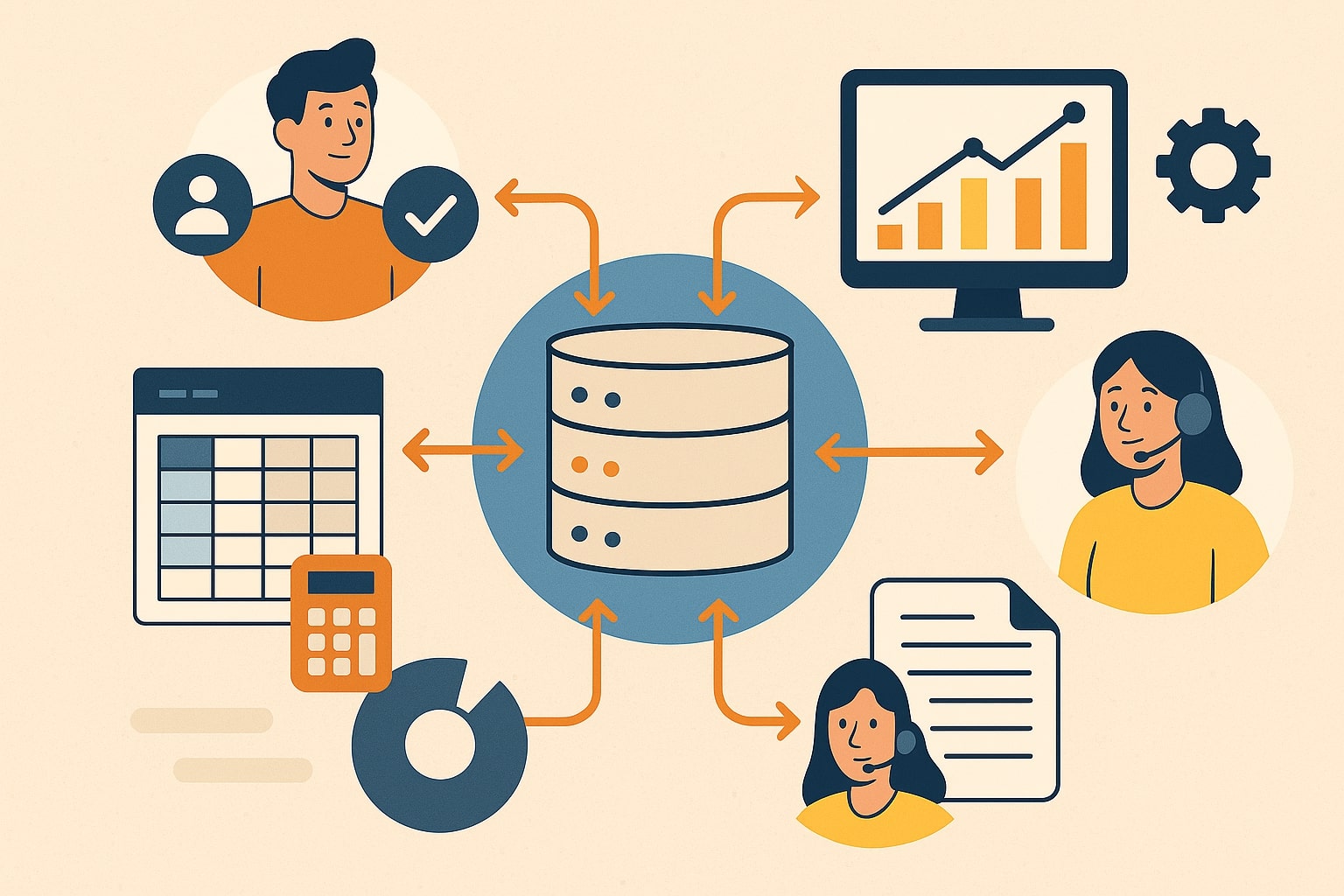KSOFT
In the modern digital landscape, a website is no longer just a marketing tool — it’s the foundation of your business ecosystem. For business owners, a website should do more than display your brand name and contact details. It should become the core of your operations, connecting every department, automating workflows, and delivering real-time data that drives better decision-making.
This is where integrating CRM (Customer Relationship Management) and ERP (Enterprise Resource Planning) systems with your website can make a game-changing difference. Instead of juggling multiple tools, managing data manually, and relying on scattered reports, you can bring everything together in one seamless, automated system.
Most small and medium-sized businesses face the same operational challenge: their tools don’t talk to each other. Sales teams work in one platform, accounting in another, operations in spreadsheets, and customer support in a completely different tool. This creates silos, slows down response times, and leads to costly errors.
Integrating CRM and ERP with your website eliminates this gap. It enables your business to:
In short, it’s not just about building a website. It’s about building a connected business.

A CRM system helps businesses capture, manage, and nurture leads efficiently. It provides your team with complete visibility of your customer journey — from their first interaction with your website to the point where they become a loyal client.
When you integrate a CRM with your website:
For example, imagine a visitor fills out your website’s “Request a Quote” form. Instead of receiving a generic notification and waiting for someone to manually process it, the CRM automatically creates a new lead, assigns it to a sales representative, and triggers a personalized email. This removes delay and ensures no lead is missed.
Automation Solutions for Small Businesses and Custom Web Development Services in India play a crucial role in implementing this kind of automation — enabling even small companies to function like large, well-organized enterprises.
While CRM handles the front end of customer relationships, ERP focuses on the backend — managing resources, finance, supply chain, inventory, and daily operations.
By integrating an ERP system with your website, you can:
For example, a customer places an order through your e-commerce website. Instantly, the ERP deducts the product from the inventory, creates an invoice, notifies the shipping team, and updates the financial record. This creates a smooth and error-free workflow, giving customers faster service and your team greater efficiency.
Custom Software Development with AI can enhance this process further, using predictive analytics to forecast demand, prevent stockouts, and automate reordering.
When CRM and ERP are both connected to your website, they create an integrated loop of information that flows freely between departments.
Here’s a typical flow:
Instead of fragmented tools, everything works as a single intelligent system.
This kind of structure is especially beneficial for companies investing in Custom E-Commerce Store Development or growing service-based businesses that depend on real-time data to scale.
With all your data connected through CRM and ERP, your leadership team can make decisions based on accurate, real-time information rather than guesswork. You can identify bottlenecks, track performance, and act quickly.
Manual tasks like follow-ups, billing, reporting, and inventory management are automated. This not only saves time but also minimizes errors.
From the moment a customer interacts with your website to the time their order is fulfilled, the entire journey is smoother. Real-time updates and faster responses build trust and increase customer loyalty.
When sales, marketing, finance, and operations have access to the same system, coordination improves significantly. Teams can collaborate more effectively, reducing delays and confusion.
As your business grows, the integrated system can easily handle more leads, orders, and customers without overwhelming your team. You won’t have to rebuild your infrastructure every time you expand.
Startup Tech Services and 24/7 Technical Support for Websites & Apps ensure these systems remain optimized and secure as your operations scale.
Not all CRMs and ERPs are built the same. Choosing the right technology depends on your business model, size, and growth goals.
Working with a team like KSoft Technologies, which specializes in Custom Web Development Services in India, ensures your integrations are secure, scalable, and future-proof.
Before integrating, identify your pain points. Do you want to improve lead management? Reduce order processing time? Eliminate manual data entry? A clear objective helps you choose the right tools.
Select CRM and ERP systems that work well together and integrate smoothly with your website platform.
No two businesses are the same. Create workflows tailored to your processes, ensuring automation enhances your unique operations.
Start by integrating one module at a time, such as lead capture or inventory management. This makes testing and troubleshooting easier.
The success of any system depends on how well your team uses it. Conduct proper training and create standard operating procedures.
Track performance after integration. Identify what’s working and what can be improved. Continuous optimization ensures long-term success.
Consider a mid-sized retailer that used to manage sales manually. The sales team received leads through a website contact form, transferred data to spreadsheets, forwarded them to another department for invoicing, and manually updated inventory. This process took hours, sometimes days, and resulted in missed sales.
After integrating a CRM system with the website, leads were automatically routed to the sales team. An ERP system was added to manage order processing and inventory in real time. The result:
This is a classic example of how Automation Solutions for Small Businesses can create measurable impact and long-term business growth.

Avoiding these mistakes ensures a smooth transition and helps you maximize your return on investment.
Once integration is complete, ongoing support is essential. Businesses should invest in:
This is where 24/7 Technical Support for Websites & Apps adds immense value. Having experts available at all times ensures your integrated systems remain stable, secure, and efficient.
In a world where speed, data, and customer experience define success, businesses can no longer afford to treat their websites as static pages. A modern business website should be the operational brain of your company, connecting CRM and ERP systems into a single intelligent ecosystem.
With Custom Web Development Services in India, Automation Solutions for Small Businesses, Custom Software Development with AI, Startup Tech Services, and Custom E-Commerce Store Development, you can transform your business into a scalable, efficient, and customer-driven operation.
By embracing integration today, you future-proof your business for tomorrow. Your website can do more than just represent your brand — it can run your entire business with precision and power.
